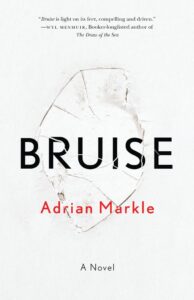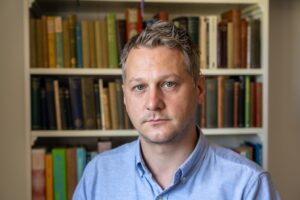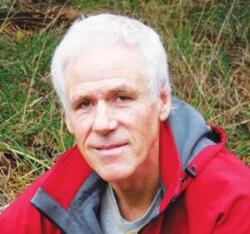On ‘the path in front of him’
Bruise
by Adrian Markle
Victoria: Touchwood Editions, 2024
$24.00 / 9781990071072
Reviewed by Theo Dombrowski
*

Homer’s The Odyssey concludes with the return of the renowned hero to his home. In some versions of the story (like Tennyson’s “Ulysses”) the once great man is riven with feelings of restlessness, alienation, and yearning to regain lost glory. Adrian Markle’s debut novel, Bruise, echoes the pattern—and, in spite of its comparative slightness and mundane setting in a decaying fishing town, feels strangely like a primal myth.
Originally from British Columbia, Markle, now teaching creative writing in the UK, rests his novel on the shoulders of a single character, Jamie Stuart. In most ways an undistinguished small town boy, Jamie, now thirty-two, is a former mixed martial arts world champion. But no longer. Penniless and injured, he returns to his town, hoping to heal and make the kind of comeback that fuels the storyline of many a movie and novel.
While Markle has chosen these familiar narrative elements, his novel feels not just authentic but gnawingly fresh. Like his brother Sid, his only surviving family member, Jamie tries to shed memories both of his physically abusive father and of his own role in the accidental death of his younger brother, Dex. Told that he will never be able to fight again, Jamie makes several attempts to build a new life while hoping, almost against hope, for the great comeback. Three failed job prospects and one failed intimate relationship later, he finds closing around him the steel jaws of Sid’s world of alcohol abuse, poverty, and crime.
Writing from deep within Jamie’s perspective, Markle makes sure that the reader directly experiences every moment and inflection of his protagonist’s emotions and thoughts. These are strikingly complex and raw—and all the more because they come to the reader through a register of language true to Jamie’s cramped background: “he was not sure if he was mad at her for saying it, or mad at Sid or himself.”
With, in addition, his attention to sensory detail, Markle makes it almost impossible for his readers to disengage from Jamie’s acute perceptions. Even a tiny fragment of sensation can be both ordinary and extraordinary: “The spines of some of the feathers pushed through the pillowcase and scraped his skin.”
Even more striking is the way the author can make the sensory world resonate far beyond the mundane. Take two very different examples. Evoking the sense of a threatening trap around Jamie and Sid, Markle writes, “The red of the exit sign shined back at Jamie from Sid’s eyes.” The line is direct, blunt, and almost shocking. Or take a far-reaching example. Impulsively, Jamie and Sid decide they will no longer accept that the house they have inherited from their brutal father will be a “mausoleum.” They decide, instead, to renovate—or, as the author has Jamie decide, “to destroy what his father had built.”
This kind of writing where the words lift off the page is particularly effective, in Markle’s hands, at the ends of chapters: after an outburst of defiance by his father’s gravestone, Jamie “climbed back over the wall and up the hill away from the cemetery without looking back, instead fixing his attention on the path in front of him, making sure he didn’t lose his footing as he moved forward.”
While thus making moments resonate intensely, the author seems deliberately to reject conventional plot suspense. Certainly there is a sustained forward drive in Bruise as Jamie tries to rebuild, regrow, and escape. Certainly, too, the narrative is often infused with moments of anxiety and threat. In the bar, where Jamie fitfully works, for example, an aggressive local, Paul, seems repeatedly to be spoiling for violence. More threatening tension builds as Sid connects Jamie with such sinister figures as a “Nazi-Frankenstein-looking motherfucker.”

Yet, in nearly every instance of potentially suspenseful conflict, Markle opts not for primary, harsh colours but for greys: instead of harrowing drama, he offers subdued complexity. Paul, for example, after bating Jamie for so long, simply fades into being old, damaged man: “His back hunched lower. His voice was quieter.” Likewise, the highest moment of tension in the novel, with menacingly violent men, ends in a darkly quiet stand-off.
Significantly, too, such seminal moments are wedged between passages of narrative set in the past. Starting with a passage headed “Age Fourteen” and ending with “Age Thirty,” the author recreates a past, Jamie’s past, that deeply penetrates his present. The match in which Jamie lost to a Japanese fighter and crushed his hand Markle shows to be much more than just a memory. It is “…more like time travel. I just go back there every time I close my eyes.” The bruises endure.
And the truly enduring bruises come from Jamie’s own family. In his Acknowledgements, the author says he came “to see that this was about family rather than sport or crime.” The father’s drunken beatings on the beach under the guise of teaching his boys how to fight has, by a twist, led to his son’s entire career in mixed martial arts. Painfully, the accidental death of Dex has saddled Jamie with gnawing guilt and crippled self-esteem. The family photographs still in the living room are as insistently present as the cemetery Sid and Jamie visit—and revisit.
Amplifying the bruises sustained from the past is poverty. It is poverty that drives Sid to find money for his estranged wife and daughter; it was also poverty that drove him to pay for his father’s funeral through crime: “…one morning, Dad’s floating in the harbour and I got nothing to pay for all his funeral with, and lawyers and whatever, so I go back to the side work. What else could I do?” What else? There is, for this whole town, as Markle emphasizes, so little else: “No one in this town can afford anything.” And, where might there be a reprieve granted by government funding? Well, the “government seems to have decided not to ‘waste’ their time or money on any social programs….”
Penetrating every corner of this cramped and desolate world, in a town with “the world’s shittiest beach and a lot of bitter people,” is, unsurprisingly, alcohol. If poverty is the villain of the novel, its ruthless accomplice is alcohol. Rarely a page goes by without Markle writing about a hefty drink of whisky. Not often has a writer documented quite so many drinks, so many episodes of drinking; not often has rock bottom been so disturbingly imagined as that where the two brothers crazily pour whisky over themselves in a kind of manic baptism.
And yet, pointedly, at the beginning of the novel Jamie refuses all alcohol. The reason is simple: he arrives home as the disciplined, driven athlete. For, as much as Bruise is about damaged lives in a damaged town, it is also a novel about the contrasting world of mixed martial arts.
Perhaps to dispel any popular misconceptions, Markle has Jamie insist, “It’s not about negativity. It’s not about destruction. It’s just the opposite.” Further, with his emphasis on astounding training discipline, MMA is painted not as brutal entertainment but as the most elite of elite sports.
Any readers looking for blow-by-blow descriptions of blood-splattered fights will have to take their blood lust elsewhere. While revealing fascinating depth of technical knowledge (documenting, for example, different kids of blows, even techniques of bandaging hands) Markle does not dish up spectacles of violence and victory. Rather, he interlocks Jamie’s commitment to the sport with his sense of identity and his emotional life: “He’d give anything to be in the cage. Not because he wanted to hurt anyone or because he wanted money. But because it was simple, and he understood it. Because he knew how to be.”
As Markle shows, however, Jamie’s immersion MMA has dark sides. First as Jamie realizes afterward, his life has been stunted: “I just trained. On the road by dawn, in the gym in the morning, home again in the afternoon for food and shower and a nap, then back in the gym for the later afternoon and evening to repeat.” It has also been a world of exploitation, a world where a talented young man can no longer feel that anywhere else is “home.” It is, worse, a fickle, disloyal world. When Jamies has to stop fighting because of his injury, he is stripped of his champion’s belt and loses all of his sponsorships: “He sometimes felt vultures were… circling him.” Disturbingly, the sport has damaged his brain: as Jamie puts it, dully, “things had been getting cloudy.”
At this point readers must accept Jamie’s confession. Yet the fact is, in Jamie, the author has created a central character for whom the word “cloudy” feels utterly wrong. Rather, the reverse: Jamie is an intensely vital creation. In one context, Markle writes, “…Jamie hadn’t ever needed to be good at subtlety. He was good at knocking holes right through the middle of things.” Most readers will readily agree.
Jamie feels—and he feels deeply. Like any other complexly imagined character, he is unpredictable, but with a range of responses that cohere into a living whole. Given to feeling “anger and anxiety and hopelessness,” even during his successful fighting career, when he loses a fight he apologizes relentlessly, even crying. And back home, his feelings worsen, turning to shame: he is “ashamed of his writing like he was everything else.”
His only release, besides alcohol, is to run from one manic outburst to another—whether, for example, turning the methodical demolition of his father’s house into uncontrolled smashing, or stealing a commemorative plaque honouring his achievements and hurling it from a clifftop into the ocean.
Yet apparently at the opposite pendulum swing, he repeats, almost like a mantra, “I was world champion.” Far from using this boast to suggest egotism, though, Markle uses it as a key to illuminating Jamie: his protagonist is trying not just to discover his identity, but also to define it. New back in town, the “world champion” refuses to accept a demeaning job. However, he changes. Grimly, he comes to decide, “It was alright to be real about who you’d become, right?”
In the process of becoming “real” Jamie recalls the words of his trainer: “That kid he doesn’t know you, but he needs you….” The words feed into a brooding, transformative resolution. He reluctantly agrees to help his brother, and, strangely, a scarred local youth he spots: “…he wanted to be there to help Sid the way he hadn’t before, but this boy… surely he needed protecting too.”
It is this desire to fill a “need” that Markle allows to bleed into the moving, strangely simple conclusion to an emotionally complex novel. In quiet language he writes of Jamie—maybe—having a visionary encounter with his dead younger brother: “In the grass he thought he saw another figure, a boy, blond haired and pale. He held up his hand, maybe. Jamie held up his hand to him. And then through a flicker of the grass he was gone.” The painfully hopeful passage ends in silence. The spectral boy held up his hand, yes, but just ”maybe.”
The last few pages avoid either tragedy or triumph. Instead, they provide a kind of redemptive alchemy of moments from Jamie’s harrowing childhood. If Jamie finds recovery from the lingering bruise of his past, it is with two scrawny boys he tries to teach martial arts on the same patch of “shitty beach” where as a boy, he felt his first blows from his father. His comeback, in the end, is both tiny and yet real; almost paltry, but oddly magnificent.
*

Born on Vancouver Island, Theo Dombrowski grew up in Port Alberni and studied at UVic and later in Nova Scotia and London, England. With a doctorate in English literature, he returned to teach at Royal Roads, UVic, and finally Lester Pearson College in Metchosin. He also studied painting and drawing at Banff School of Fine Arts and UVic. He lives at Nanoose Bay. Visit his website here. [Editor’s note: Theo Dombrowski has written and illustrated several coastal walking and hiking guides, including Secret Beaches of the Salish Sea (Heritage House, 2012), Seaside Walks of Vancouver Island (Rocky Mountain Books, 2016), and Family Walks and Hikes of Vancouver Island (RMB, 2018, reviewed by Chris Fink-Jensen), as well as When Baby Boomers Retire. He has reviewed books by Tim Bowling, Lisa Brideau, Brady Marks and Mark Timmings, Darrel J. McLeod, Max Wyman, Dustin Cole, Deborah Willis, Lindsay Wong, and Bill Engleson for BCR.]
*
The British Columbia Review
Interim Editors, 2023-25: Trevor Marc Hughes (nonfiction), Brett Josef Grubisic (fiction)
Publisher: Richard Mackie
Formerly The Ormsby Review, The British Columbia Review is an online book review and journal service for BC writers and readers. The Advisory Board now consists of Jean Barman, Wade Davis, Robin Fisher, Barry Gough, Hugh Johnston, Kathy Mezei, Patricia Roy, Maria Tippett, and Graeme Wynn. Provincial Government Patron (since September 2018): Creative BC. Honorary Patron: Yosef Wosk. Scholarly Patron: SFU Graduate Liberal Studies. The British Columbia Review was founded in 2016 by Richard Mackie and Alan Twigg.
“Only connect.” – E.M. Forster
2 comments on “On ‘the path in front of him’”